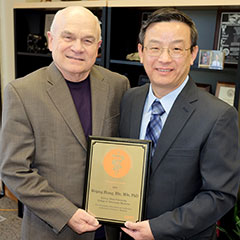April 9, 2018
College of Veterinary Medicine presents research excellence award to Weiping Zhang

The College of Veterinary Medicine at Kansas State University presented its highest research award during its annual Phi Zeta Research Day activities on March 6: The 2018 Zoetis Animal Health Award for Research Excellence. Weiping Zhang was chosen as this year's recipient. He is a professor in the diagnostic medicine and pathobiology department.
Zhang's research mainly focuses on enterotoxigenic Escherichia coli, or ETEC, pathogenesis in diarrheal disease and vaccine development against ETEC associated diarrhea. His laboratory has applied the toxoid and toxoid fusion strategies and demonstrated for the first time that non-toxic STa molecules induced neutralizing antibodies against the key heat-stable toxin, invented the MEFA technology to develop structure-based vaccines against heterogeneous ETEC strains, and developed and applied a pig model to study human ETEC diarrhea disease.
"I am very honored to be the recipient of this prestigious research award," Zhang said. "ETEC bacteria are a predominant cause of neonatal diarrhea and post-weaning diarrhea in pigs, and a top cause of diarrhea in young children in developing countries and international travelers. Currently there is no effective vaccine against ETEC diarrhea in pigs or humans. The innovative toxoid fusion and MEFA technologies as well as the pig challenge models developed in this laboratory finally makes it feasible for development a broadly protective vaccine against ETEC diarrhea."
"Dr. Zhang is working at the cutting edge of vaccine technology — developing novel vaccines to combat diarrheal pathogens in both young pigs and children," said Frank Blecha, associate dean for research. "He has supported his extensive research program at K-State with over $12 million of funding from several agencies, including the National Institutes of Health, the U.S. Department of Agriculture and the Bill and Melinda Gates Foundation. Dr. Zhang's collaborative vaccine development strategy for enterotoxigenic E. coli holds great promise for a new multiepitope vaccine that will limit diarrheal deaths in animals with high relevance for human health as well."
Zhang's most recent innovation is structure-based MEFA – multiepitope fusion antigen, a novel structural vaccinology technology for development of broadly protective multivalent ETEC vaccines. Different ETEC strains produce immunologically virulence factors. Virulence heterogeneity is a major challenge in vaccine development against infectious diseases. This versatile MEFA technology can be generally applied for vaccine development against other pathogens as well. Only broadly protective vaccines would be effective against ETEC and other heterogeneous pathogens.
Zhang received his bachelor's degree and master's degree training in China. He earned a doctorate at Iowa State University in 1996. He has been teaching at K-State since 2013. Prior to that he was on the faculty at South Dakota State University.
